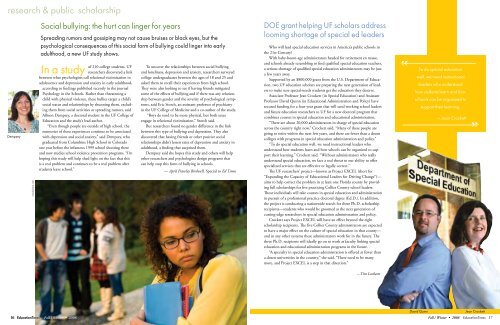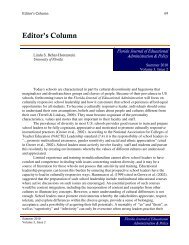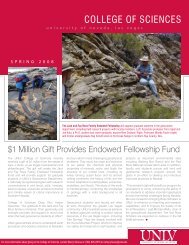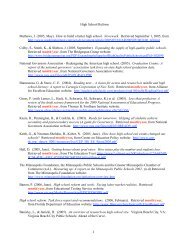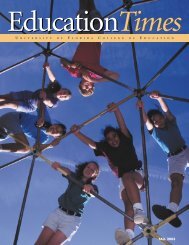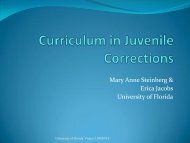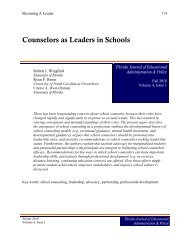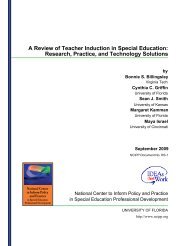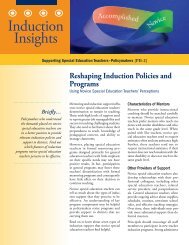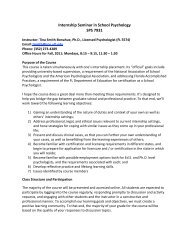Revival - College of Education - University of Florida
Revival - College of Education - University of Florida
Revival - College of Education - University of Florida
- No tags were found...
Create successful ePaper yourself
Turn your PDF publications into a flip-book with our unique Google optimized e-Paper software.
”research & public scholarshipDempseyistockphoto.comSocial bullying: the hurt can linger for yearsSpreading rumors and gossiping may not cause bruises or black eyes, but thepsychological consequences <strong>of</strong> this social form <strong>of</strong> bullying could linger into earlyadulthood, a new UF study shows.In a study<strong>of</strong> 210 college students, UFresearchers discovered a linkbetween what psychologists call relational victimization inadolescence and depression and anxiety in early adulthood,according to findings published recently in the journalPsychology in the Schools. Rather than threatening achild with physical violence, these bullies target a child’ssocial status and relationships by shunning them, excludingthem from social activities or spreading rumors, saidAllison Dempsey, a doctoral student in the UF <strong>College</strong> <strong>of</strong><strong>Education</strong> and the study’s lead author.“Even though people are outside <strong>of</strong> high school, thememories <strong>of</strong> these experiences continue to be associatedwith depression and social anxiety,” said Dempsey, whograduated from Columbine High School in Coloradoone year before the infamous 1999 school shooting thereand now studies school violence prevention programs. “I’mhoping this study will help shed light on the fact that thisis a real problem and continues to be a real problem afterstudents leave school.”To uncover the relationships between social bullyingand loneliness, depression and anxiety, researchers surveyedcollege undergraduates between the ages <strong>of</strong> 18 and 25 andasked them to recall their experiences from high school.They were also looking to see if having friends mitigatedsome <strong>of</strong> the effects <strong>of</strong> bullying and if there was any relationshipbetween gender and the severity <strong>of</strong> psychological symptoms,said Eric Storch, an assistant pr<strong>of</strong>essor <strong>of</strong> psychiatryin the UF <strong>College</strong> <strong>of</strong> Medicine and a co-author <strong>of</strong> the study.“Boys do tend to be more physical, but both sexesengage in relational victimization,” Storch said.But researchers found no gender difference in the linkbetween this type <strong>of</strong> bullying and depression. They alsodiscovered that having friends or other positive socialrelationships didn’t lessen rates <strong>of</strong> depression and anxiety inadulthood, a finding that surprised them.Dempsey said she hopes this study and others will helpother researchers and psychologists design programs thatcan help stop this form <strong>of</strong> bullying in schools.— April Frawley Birdwell, Special to Ed TimesDOE grant helping UF scholars addresslooming shortage <strong>of</strong> special ed leadersWho will lead special education services in America’s public schools inthe 21st Century?With baby-boom-age administrators headed for retirement en masse,and schools already scrambling to find qualified special education teachers,a serious shortage <strong>of</strong> qualified special education administrators may be justa few years away.Supported by an $800,000 grant from the U.S. Department <strong>of</strong> <strong>Education</strong>,two UF education scholars are preparing the next generation <strong>of</strong> leadersto make sure special-needs students get the education they deserve.Associate Pr<strong>of</strong>essor Jean Crockett (in Special <strong>Education</strong>) and AssistantPr<strong>of</strong>essor David Quinn (in <strong>Education</strong>al Administration and Policy) havesecured funding for a four-year grant that will send working school leadersand future education researchers to UF for a new doctoral program thatcombines courses in special education and educational administration.“There are about 20,000 administrators in charge <strong>of</strong> special educationacross the country right now,” Crockett said. “Many <strong>of</strong> these people aregoing to retire within the next few years, and there are fewer than a dozencolleges with programs in special education administration and policy.”“To do special education well, we need instructional leaders whounderstand how students learn and how schools can be organized to supporttheir learning,” Crockett said. “Without administrators who reallyunderstand special education, we face a real threat to our ability to <strong>of</strong>ferspecialized services that are effective or legally correct.”The UF researchers’ project—known as Project EXCEL (short for“Expanding the Capacity <strong>of</strong> <strong>Education</strong>al Leaders for Driving Change”)—aims to help correct the problem in at least one <strong>Florida</strong> county by providingfull scholarships for five practicing Collier County school leaders.Those individuals will take courses in special education and administrationin pursuit <strong>of</strong> a pr<strong>of</strong>essional practice doctoral degree (Ed.D.). In addition,the project is conducting a nationwide search for three Ph.D. scholarshiprecipients—students who would be groomed as the next generation <strong>of</strong>cutting-edge researchers in special education administration and policy.Crockett says Project EXCEL will have an effect beyond the eightscholarship recipients. The five Collier County administrators are expectedto have a major effect on the culture <strong>of</strong> special education in that county—and in any other systems these administrators work for in the future. Thethree Ph.D. recipients will ideally go on to work as faculty linking specialeducation and educational administration programs in the future.“A specialty in special education administration is <strong>of</strong>fered at fewer thana dozen universities in the country,” she said. “There need to be manymore, and Project EXCEL is a step in that direction.”To do special educationwell, we need instructionalleaders who understandhow students learn and howschools can be organized tosupport their learning.— Jean Crockett”– Tim LocketteDavid QuinnJean Crockett16 <strong>Education</strong>Times Fall / Winter • 2008Fall / Winter • 2008 <strong>Education</strong>Times 17


